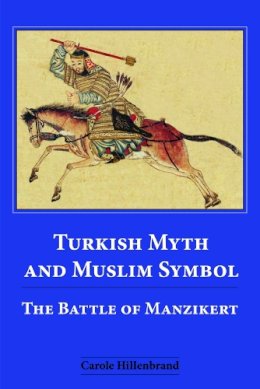11%OFF

Stock image for illustration purposes only - book cover, edition or condition may vary.
Turkish Myth and Muslim Symbol: The Battle of Manzikert
Carole Hillenbrand
€ 41.99
€ 37.50
FREE Delivery in Ireland
Description for Turkish Myth and Muslim Symbol: The Battle of Manzikert
Paperback. This book aims to make a contribution to historical scholarship on Turkey by focusing on its key foundational myth, the battle of Manzikert in 1071. Num Pages: 304 pages, 20 colour illustrations. BIC Classification: 1DVT; HBJF; HBLC; JPHC; JWLF. Category: (P) Professional & Vocational; (UP) Postgraduate, Research & Scholarly. Dimension: 233 x 159 x 17. Weight in Grams: 582. The Battle of Manzikert. 304 pages, 20 colour illustrations. This book aims to make a contribution to historical scholarship on Turkey by focusing on its key foundational myth, the battle of Manzikert in 1071. Cateogry: (P) Professional & Vocational; (UP) Postgraduate, Research & Scholarly. BIC Classification: 1DVT; HBJF; HBLC; JPHC; JWLF. Dimension: 233 x 159 x 17. Weight: 582.
Turks ruled the Middle East for a millennium and eastern Europe for many centuries and it is an undoubted fact that they moulded the lands under their dominion. It is therefore something of a paradox that the history of Turkey and aspects of the identity and role of the Turks, both as Muslims and as an ethnic group, still remain little known in the west and undervalued in the Arabic and Persian-speaking worlds. This book contributes to historical scholarship on Turkey by focusing on its key foundational myth, the battle of Manzikert in 1071 -- the Turkish equivalent of the battle of Hastings. Manzikert destroyed the hold of Christian Byzantium on eastern Turkey and opened the whole country to the spread of Islam, a process completed with the fall of Constantinople and Trebizond some four centuries later. Translations and a close analysis of all the extant Muslim sources -- both Arabic and Persian -- which deal with the battle of Manzikert are provided in the book. It also looks at these writings as literary works and vehicles of religious ideology and analyses the ongoing confrontation between the Muslim Turks and Christian Europe and the importance of Manzikert in the formation of the modern state of Turkey since 1923.
Product Details
Publisher
Edinburgh University Press
Number of pages
304
Format
Paperback
Publication date
2007
Condition
New
Weight
582g
Number of Pages
304
Place of Publication
Edinburgh, United Kingdom
ISBN
9780748625734
SKU
V9780748625734
Shipping Time
Usually ships in 5 to 9 working days
Ref
99-50
About Carole Hillenbrand
Carole Hillenbrand is Honorary Professorial Fellow, Professor Emerita at the University of Edinburgh. In 2005 she became the first non-Muslim scholar to be awarded the prestigious King Faisal International Prize for Islamic Studies, reflecting her 'revolutionary approach to the largely one-sided subject of the Crusades'. She is author of The Crusades (EUP, 1999), The Waning of the Umayyad Caliphate (Albany, 1989), A Muslim Principality in Crusader Times (Brill, 1990), and co-editor (with C. E. Bosworth) of Qajar Iran, (Edinburgh, 1984) and editor of The Sultan's Turret (Brill, 1999).
Reviews for Turkish Myth and Muslim Symbol: The Battle of Manzikert
'This original and thought-provoking book operates on several levels ... a captivating read that is a powerful reminder to Western scholars and students of the achievement of Turkish - rather than Arab or Persian - leaders in the history of the Muslim Near East.'
Jonathan Phillips Times Literary Supplement 'This is a passionate book with an agenda to address the importance of the Turkish contribution to the medieval period ... as well as presenting a superb deconstruction of a historical event in the memory and ideology of centuries of writers.'
Jonathan Phillips Times Literary Supplement 'This original and thought-provoking book operates on several levels ... a captivating read that is a powerful reminder to Western scholars and students of the achievement of Turkish - rather than Arab or Persian - leaders in the history of the Muslim Near East.' 'This is a passionate book with an agenda to address the importance of the Turkish contribution to the medieval period ... as well as presenting a superb deconstruction of a historical event in the memory and ideology of centuries of writers.'
Jonathan Phillips Times Literary Supplement 'This is a passionate book with an agenda to address the importance of the Turkish contribution to the medieval period ... as well as presenting a superb deconstruction of a historical event in the memory and ideology of centuries of writers.'
Jonathan Phillips Times Literary Supplement 'This original and thought-provoking book operates on several levels ... a captivating read that is a powerful reminder to Western scholars and students of the achievement of Turkish - rather than Arab or Persian - leaders in the history of the Muslim Near East.' 'This is a passionate book with an agenda to address the importance of the Turkish contribution to the medieval period ... as well as presenting a superb deconstruction of a historical event in the memory and ideology of centuries of writers.'
